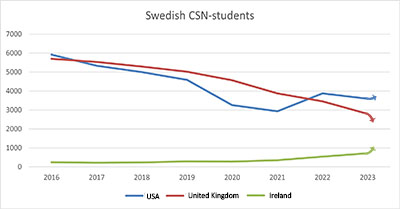Study in England, Wales or Scotland
Do you want to study in the United Kingdom? We can help you! Here we look at recommended schools, costs, applications, visas, scholarships, Brexit and much more.
Great Britain is one of the most popular study abroad destinations in the world. Here we answer frequently asked questions about studying in England, Wales and Scotland.
The English School System - What can you study in England?
How much does it cost to study in England, Wales, and Scotland?
Scholarships for studies in Britain
Can I work when I study in the UK?
Can you help me to study in the UK?
Recommended universities and language schools in England
Why study in the UK?
There are many reasons to study in the UK. They have many high-ranking universities, and all programs are taught in English. It is cheaper than studying in the US or Australia. For Eu-students it is easy to travel to the UK, and at the moment no student visa is needed for EU-nationals, but that might change after Brexit.
Britain is a very diverse study destination. Choose between:
England has the most and the highest ranking universities in Britain. Here you can choose from classical student towns like Oxford and Cambridge, lovely coastal towns like Brighton and Bournemouth or exciting big cities like London. England is also a classic destination for language travel.
Wales in southeastern Britain is often forgotten. It is a nice part of the country with beautiful scenery and low living costs. Here we can help students from Scandinavia, Netherlands, and Belgium with the entire application process to the University of South Wales.

Scotland was free for EU-students before Brexit, but now their tuition fees are similar to the rest of the UK, but it is still an attractive place to study with beautiful nature and many good universities, whereof some have quite reasonable fees. A drawback with studying in Scotland is that the Bachelor Degree’s take four years to complete here, just like in the US, while in England, Wales and the rest of Europe a Bachelor’s Degree can usually be taken in three years.
Northern Ireland is another forgotten part of Britain. Historically, it has been a troubled area, but nowadays it is quite peaceful, but they don’t have many universities.
In our school database, you will find a list of all universities in the UK (England, Wales, Scotland and Northern Ireland).
The English School System - what can you study in England?
Most international students in England study in language schools or universities. In language schools, you study English, and in the universities, you can study almost any academic subject.
England has compulsory schooling from age 5 to 16 divided into four so-called key stages where the last one includes taking the General Certificate of Secondary Education (GCSE). Then students who wish to continue at university level usually study 3-5 so-called A-levels for two years. Thus, English students are only 18 years old when they start studying at university. To be able to study A-levels, students must have passed at least five subjects in GCSEs with a grade of C or higher. The subjects you want to study at A-level level must, as a rule, have had at least a grade of B. However, the requirements vary somewhat between different schools. To be admitted to an English university, UK students need a combination of relevant A-levels with the required grades.
Students who don’t want to study at university usually study at vocational schools and further education colleges where they often take a Business and Technology Education Council (BTEC) certificate. Some international students study at these schools where you also can take foundation courses or a Higher National Diploma (HND).
When and how to apply?

The UK has a central admission system for universities called UCAS. Here you can apply to most university programs in the UK. The deadline for applications to the fall semester depends on the school and program you want to study. At the high ranking Universities of Cambridge and Oxford, the deadline is already in mid-October the year before the course starts. The same applies if you want to study medicine in UK universities. Most other universities and programs have an application deadline in mid-January. However, it is possible to make a late application until the end of June on many programs. Such applications will, however, be labeled "late" and universities don’t need to accept them.
If you apply to a college or language school, you usually apply directly on the school's website. Some universities also take applications on their own website. The advantage of applying directly to the schools is that the application is usually easier and that you can apply more closely at the start of the course.
We can help you with applications to De Montfort University in Leicester an hour north of London and Buckinghamshire New University, Arts University Bournemouth, and Hult International Business School.
We also have a partner who can give you help with the application to all other UK universities! Fill out an information request for more information.
You can also read more in our article on how to apply for a university abroad?
How much does it cost to study in England, Wales, and Scotland?
Universities in the UK currently charge national students £9250 per academic year at the undergraduate level. However, for international students the fees are higher ranging from £11000-£38000. High ranking schools have the highest fees, and subjects related to medicine are usually the most expensive.
Scholarship for studies in Britain
With the increased tuition fees, it has become more common with scholarships for studying in the UK, but it is not as common as in the US and most scholarships consists of a tuition fee discount. It is usually easier to get a scholarship if you study in smaller cities than in places like London that attract big numbers of international students. Read more in our scholarship guide.
Scholarships and discounts from our UK partners
| Academic Gap Year - 20% tuition discount - University of Roehampton (deadline 2024-12-31) |
You are also welcome to apply for DreamStudies’ Study Abroad Scholarship for studies in the UK. The application deadline is 15/12, and your studies must start the following year.
Insurance to study in the UK
If you study in the UK on a student visa you will need to pay £470/year in an Immigration Health Surcharge (IHS). This provides you with access to the National Health Service (NHS) during your studies. However, we strongly recommend that you top this up with a study abroad insurance to cover excessive costs and non health care related risks such as theft, liability etc. Read more about recommended study abroad insurances.
Student visa to the UK
EU-citizens don’t need a visa for short term courses (6 months or less) in the United Kingdom, but non-EU nationals need to apply for a short term visa. For studies over 6 months all international students need to apply for a Student Visa to the United Kingdom.
Non EU nationals must apply for a student visa for long term studies in the UK.
Can I work when I study in the UK?
Yes, students who hold a student visa and has paid the Immigration Health Surcharge can work part-time in the UK during their studies (unless their visa says otherwise). However, there are some restrictions on the number of hours they can work.
If you are studying a course at a degree level or above at a higher education institution, you are allowed to work up to 20 hours per week during term time and full-time during vacation periods. If you are studying a course at a level below degree level, such as a language course or a vocational course, you are allowed to work up to 10 hours per week during term time and full-time during vacation periods (on the condition that you have a Student Visa).
You do not need to apply for a separate work permit to work part-time on a Student Visa but you cannot start working until you have enrolled in your course and have started attending classes. You will also need to obtain a National Insurance Number before you can start working. You cannot work as a sportsperson or be self-employed.
It is important to remember that your studies should be your main priority while you are in the UK on a Student Visa, and you should make sure that any employment you take on does not interfere with your studies.
After you complete your degree in the UK, you will be eligible for a two year post-study work visa, allowing you to stay and work in the UK for up to two years.
Please note that you cannot work in the UK on a Short-term study visa (for studies 6 months or less) or if you are an EU-student who travelled visa free to the UK for a short-term course. EU citizens are no longer able to work in the UK without a visa since the end of the Brexit transition period on December 31, 2020. EU citizens who want to work in the UK must now obtain a student or work visa or have settled or pre-settled status under the EU Settlement Scheme.
What changed with Brexit?
Brexit came into effect in 2021. Non EU-students was not affected, but it involved a lot of changes for EU-students in the UK:
- Tuition fees increased after the school year 2020-2021 for new students (not students that already attended a program in the UK). EU-students now pay the same fees as other international students.
- EU-students now need to apply for student visa to study in the UK longer than 6 months
- EU-students right to work was limited to 20 hours per week.
Can you help me to study in the UK?
Yes, we have partners who can help you to choose and apply to ALL universities and many language schools in Great Britain. However, please note that we cannot help you fund your course so you will need savings to cover tuition fees and living costs. Fill out our request form and we will send you more information about studying in Great Britain.


























